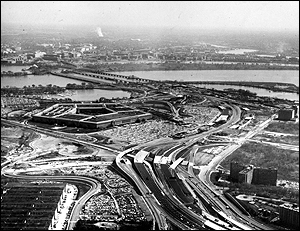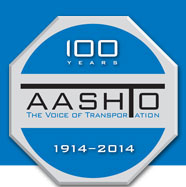
July 16, 2014
Transportation Then & Now: Transportation for a Competitive America

Shall We Wait for Traffic’s Knockout Punch?
The following speech, published in the April 1950 edition of American Highways, was given by AASHTO President D.C. Greer before the Associated General Contractors of America’s 31st Annual Convention in San Francisco. In his remarks, Greer stresses the importance of not just maintaining transportation infrastructure, but also highlights the need to think about future growth. Greer asks state highway departments to continue to look for ways to stretch highway dollars in order to “keep pace with highway demand.” Today, state DOTs are in the same situation, balancing the need to maintain current infrastructure while also preparing for future growth, all with limited transportation dollars. Check out the piece below.
We, who are gathered here today, have the privilege of being citizens of America, the greatest nation in the world, measured by any yardstick we may choose. This is an automotive age and we live in the world’s greatest automotive country. America is literally a nation on wheels. We must necessarily reach this conclusion when we realize that 42 million motor vehicles were registered in the United States of America last year. Of this amount, 7.5 million were motor trucks—one half of the trucks in the world were registered in the United States during the past year. We must stop and realize that over 50 percent of our live poultry, 69 percent of our livestock, or a total of 89 percent of our produce from the land moves from the field to the market by motor trucks in our America today.
I would ask you to stop and think for a moment about these facts in order that you may see just what the road system of America means to our health, happiness and prosperity. I would ask you to think back briefly to the founding of this great country, when our civilization began along the various sections of the seacoast where water transportation was available. Our civilization then moved inland among those watercourses where such transportation could be utilized in further development. Then came the wagon trains and the railroads, pushing our civilization further inland. The highway system, pushing further to connect our vast country in its development, finally consolidated all previous gains and made our nation one huge but closely connected whole. All in all, throughout the ages, development of civilization has moved in cycles corresponding to the development of various types of transportation. When that national transportation system staggers, as it has done during rail tie-ups and the like, the shudder is felt throughout the entire nation.
Our traffic studies show that the number of registered motor vehicles has increased approximately 30 percent in the past 10 years. We also find by these studies that the number of vehicle miles of travel on our roads has increased approximately 30 percent over this same period of time. During this period of proven increase in use of our highway systems by an increased number of vehicles, the value of our dollar has materially decreased. These factors add to the inescapable conclusion that highway construction is not keeping pace with highway demand.
Unquestionably, we are now losing ground from a highway standpoint. Our highway system must be made better and considerably expanded, if we are to keep pace with the needs of the economy of America.
The present situation is like the county fair contest in which the burly champion offers to fight all of the local talent, either singly or together. The champion Traffic has been challenged by the Road Planners, the Road Builders and the Road Users. The contest is on between Traffic and the Road Builders and Planners, while the Road Users stand by. If Traffic beats his first two opponents, as it appears he may, the Road Users will catch the full brunt of his attack. Traffic has landed several telling blows. A hard left-hook was the lay-off of road building during the war. A right uppercut was the drain on construction funds by maintenance. He readies a haymaker labeled insufficient financing from lack of foresight.
I do not believe that America is ready to accept defeat on anything, much less on its highway transportation system. I further believe that the American people desire and expect their leaders in each field of endeavor to point out to them those things which need to be done, in order to prevent such defeat. I therefore consider it the incumbent responsibility of the highway officials of this country to point out those things that must be done, in order that the people may have the guidance of such advice in winning this battle against traffic.
Based upon this premise, it will be the privilege of the American Association of State Highway Officials to present to the National Congress, in the near future, our report on the condition of the roads of this nation and our suggestion as to their possible procedure, in order to provide for the proper and orderly improvement of our vast system of roads. We will recommend to the Congress that the Federal Aid Principle of assistance to roads, which has been the custom of this country for the past quarter of a century, be continued during the coming two-year period.
We will recommend to the Congress that annual authorizations of Federal Aid Funds be made on the basis of $810 million per year, as compared with $450 million per year during the past two years. We will further suggest to the Congress that the three categories of roads, namely: Primary, Secondary, and Urban, be expanded to include a fourth category, namely: The Interstate Highway System. We will suggest that the matching basis by the states be retained, as has been the custom in the past, and that all of the principles of federal aid for highways, that have proven so successful in the past years, be continued in the renewal of this act. We suggest certain improvements in procedure in an effort to modernize the activity of the law and to expedite the movement of the programs of work. We are hopeful, indeed, that the Congress will find it possible to grant this program of work, in order that we may regain the ground lost on highways during the war time period, as well as expand our system to meet the growing needs of this country.
Assuming that the Congress may find it possible to provide this new leadership in the development of our road system, there are certain things that must be done on the home front, namely, at the state and local level, in order to make this program completely workable. This is where a group, such as this organization, can render a vast service to the road system of our nation, not only by your continued interest as citizens, but by an expressed interest in highway affairs in your localities. In the first place, I would urge you to lend aid and assistance to your state highway departments in their efforts to improve their administrations of highway matters on the state level. Outmoded highway laws should be modernized to cope with the present day problems of state highway departments. State laws, controlling the boards or commissioners, which establish the policies for your state highway department, should be streamlined and strengthened and removed as far as possible from politics, in order that proper men may be induced to accept these posts of responsibility and may be permitted to carry out the administration of the various state highway departments in such a manner as to provide expeditious, efficient and economical utilization of available funds.
Secondly, if you would take time to examine the financial structure of the state highway department in your particular state, you might find that certain leaks in its finances still prevail in spite of the vast improvements in most states throughout the country. Some states will have diversion of motor user revenues from highway purposes. This should be stopped as early as possible by constitutional amendments against diversion, as has been done by the majority of the states in the union at the present time. In addition to diversion, you may find certain dispersions that could be stopped, in order to funnel more of the highway user revenues of a given state into the highway system that so badly needs such funds. In some states you may find the refund system on gasoline tax badly abused and constituting a leak in highway revenues that would be of vast benefit to the road system in the state were the law concerning refunds rigidly enforced. Upon examination, you may find in some of the states that the law provides that the trucks shall pay license fees commensurate with the loads expected to be carried over the highways. You may find that, due to lack of adequate policing or a weak registration system, trucks are not being required to pay into the road fund those fees as specified by the law. This in many cases would constitute a substantial leak in highway revenues.
I have tried to point out to you a few of the things that you could do on the home front in order that you might be assured that all of the highway users’ tax money, which is specified by the laws in your state, shall find its place under the rubber of the moving traffic on your roads today. I would urge that you take an active interest in these matters in your respective state, because I feel that your help would be of untold benefit to your state highway department in its attempt to meet its obligations.
The citizens of America must not become complacent about their motor transportation system, but should awake to the fact that the ever increasing use of this indispensable medium of interchange, structural deterioration is being hastened and an ever increasing highway mileage is rapidly becoming deficient in width, sight distance, strength, and other features so necessary to the safe and efficient movement of traffic. Additional investments in the road system of America will be repaid the taxpayers tenfold. We must declare all-out war on the day by day wear and tear on our highway system and in typical American fashion, move ahead to an orderly and decisive victory.












